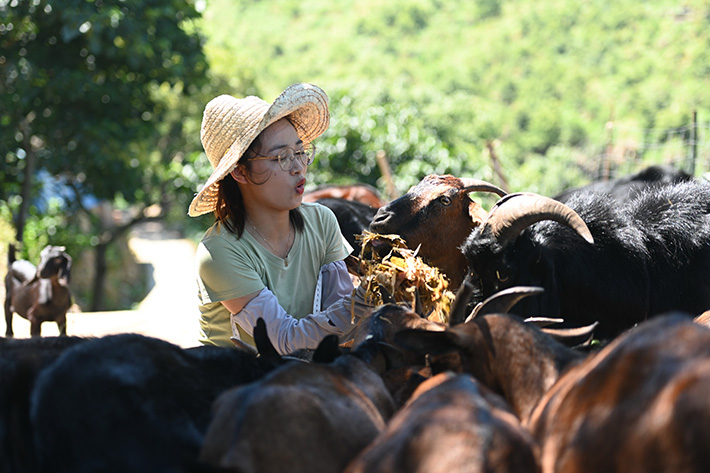|
||||||||||
| Home Nation World Business Opinion Lifestyle ChinAfrica Multimedia Columnists Documents Special Reports |
|
||||||||||
| Home Nation World Business Opinion Lifestyle ChinAfrica Multimedia Columnists Documents Special Reports |
| ChinAfrica |
| On an Equal Footing |
| Women are playing an increasingly bigger role in China’s economy |
| By Yang Hui 丨VOL. 15 April 2023 ·2023-03-27 |

Fan Yadong, a female scientist, collects insect samples in Yushu, Qinghai Province, on 26 July 2022
‘I
In 2020, the wholesale shop of tonic products that her parents had run for more than 30 years was at the brink of shutdown due to the COVD-19 pandemic. Fang decided to help and started to seek opportunities in e-commerce.
To stand out from many shops operating online, she decided to trigger nostalgia, evoking people’s feelings about Cantonese food culture by sharing online authentic Cantonese cuisines, especially seasonal soups. Her well-made videos got a lot of attention, and more and more people showed interest and joined her in making Cantonese food. The sales of the shop greatly increased, and her customer base expanded from the local community to all over the country.
Fang’s story is an epitome of how today’s Chinese women are involved in employment and entrepreneurship. China has not only made plans to encourage women to get jobs and to start businesses in multiple strategic deployments, but also created a favourable environment for women’s employment and entrepreneurship by setting development goals and providing financial support.
A powerful force
Statistics show that in 2021, the number of employed women in China reached 322 million, accounting for 43.1 percent of the workforce. With the rapid development of the Internet economy, especially e-commerce, there are more and more women like Fang who have become e-commerce influencers or engaged in livestreaming sales. The year 2022 registered 23.58 million female shop owners on e-commerce platform Taobao alone, more than twice as many as in 2016. Women also accounted for 55 percent of entrepreneurs in the Internet field.
New economies such as the platform economy, sharing economy and influencer economy have offered women more job opportunities. In 2022, a total of 57 million women were employed in the fields of digital trade, e-commerce and livestreaming in China. In rural areas, women who used to work on farmlands have also found non-agricultural employment in these new fields. According to a 2021 report on China’s rural women employment by Central China Normal University, women account for 72 percent of the cloud customer service staff of Alipay, China’s leading online payment platform; women also account for 62.3 percent and 53 percent of artificial intelligence trainers and village livestreaming e-commerce anchors, respectively.
Jobs that are traditionally associated with men, such as driving and delivery, are seeing more women participation with the boom of the digital economy. Women earn good incomes in these professions. The number of women drivers registered on ride-hailing platform Didi was 2.37 million in 2021, over 12,000 of whom were from impoverished families, and 16.21 percent takeaway food couriers in Beijing were women in 2021, up from 9.06 percent in 2020. Nationwide, 1.6 million women worked as takeaway food couriers in 2022.
In the science and technology sector, there are more and more women joining in the workforce as well. According to a 2022 UNESCO report, 45.8 percent of China’s science and technology workers are women, numbering nearly 40 million, higher than the 33 percent globally. As of 2020, there are 1.98 million women working in research and development (R&D), an increase of 1.09 million from 10 years ago. In addition, the proportion of women in male-dominated jobs of the Internet sector such as technology and R&D is increasing, with women accounting for 19.5 percent in 2021, a year-on-year increase of 1.6 percentage points.
The widening access to various jobs has not only improved the income of women, but also provided them with more opportunities to excel in their fields of expertise, as well as to have a bigger influence and contribute more to the neighbourhood and beyond.
“In these years, I have sold all the apples of my family and my neighbours via e-commerce, and my parents have more smiles on their faces because of the stable and considerable income,” said Wen Yangyang, a woman in her late 20s in Lixian County, Gansu Province in northwest China. Born in a poor farmer’s family, she dropped out of school to work at the age of 15. In 2014, the county’s call to develop e-commerce ignited her passion for entrepreneurship. By attending e-commerce trainings, she learned to sell apples using her mobile phone, and sold out the family’s more than 600 boxes of apples that year.
In 2015, she went further and helped her neighbours to sell more than 1,500 kg of apples. In 2016, she started nurturing agents, and has now driven more than 20 young people in villages to engage in the e-commerce business.
In the county of Bobai, Guangxi Zhuang Autonomous Region in southwest China, Huang Lianjiang was amazed by the annual sales of 12 million yuan ($1.74 million) from a single product. Since she started doing business at e-commerce platform Alibaba’s international version in 2016, she has sold local hand-woven products to more than 60 countries including the UK, the US, Japan and Australia. Huang’s company now has 50 employees, and more than 900 farmers are working with her. Her cross-border e-commerce business has solved the problem of local women’s employment, benefitting more than 1,600 villagers, and at the same time contributed to inheriting the local handicraft skill and presenting the Chinese weaving culture to the world.
Outstanding performance of women is also seen in space exploration and the research of cutting-edge technologies. Prominent examples include Wang Yaping, China’s first female astronaut to walk in space, and Hu Hailan from Zhejiang University, the youngest recipient of the World Outstanding Female Scientist Award in 2021 for her research on the core brain mechanisms of depression.

Wang Qi, a female entrepreneur, feeds her goats in Fuding, Fujian Province, on 5 August 2022
Necessary support
Behind the important progress that have taken place in women’s employment and entrepreneurship is the assistance of organisations such as All-China Women’s Federation (ACWF) and the support of national policies in terms of funding, technology and gender equality.
In the case of the ACWF, it cooperated with government departments to solve the problem of lack of funding faced by many female entrepreneurs in the start-up period by providing them with subsidised loans and special loans. As of 2022, its Mother’s Entrepreneurship Revolving Fund has provided financial support and training to more than 463,000 women for starting their own business.
The ACWF also provides women with trainings to fill gaps in knowledge and skills, such as marketing management knowledge and live e-commerce skills. In 2020, it directly trained 15 million women e-commerce operators in poor areas and guided local women’s federations to organise more than 10,000 training sessions on e-commerce.
To create a fairer environment for women in the job market, the Population and Family Planning Law stipulates extended maternity leave and supports the establishment of parental leave in places that are able to do so, helping to alleviate work-home conflicts for women.
The Law on the Protection of Women’s Rights and Interests stipulates that it is the responsibility of employers and relevant government departments to ensure equal employment opportunities for women, and urges employers to rectify gender discrimination by imposing penalties on those who voilate women’s rights.
It is particularly noteworthy that both the 13th Five-Year Plan (2016-2020) and 14th Five-Year Plan (2021-2025) include a section on promoting the comprehensive development of women, while the national employment promotion plans for the same period explicitly seek to eliminate discrimination in employment, including gender discrimination. Such requirements are also made in other essential national documents such as the National Human Rights Action Plan of China and the Outline for Women’s Development in China.
The author is deputy director and associate researcher of the Policy and Regulation Research Office of the Women’s Studies Institute of China, ACWF
| About Us | Contact Us | Advertise with Us | Subscribe |
| Copyright Beijing Review All rights reserved 京ICP备08005356号-5 京公网安备110102005860号 |